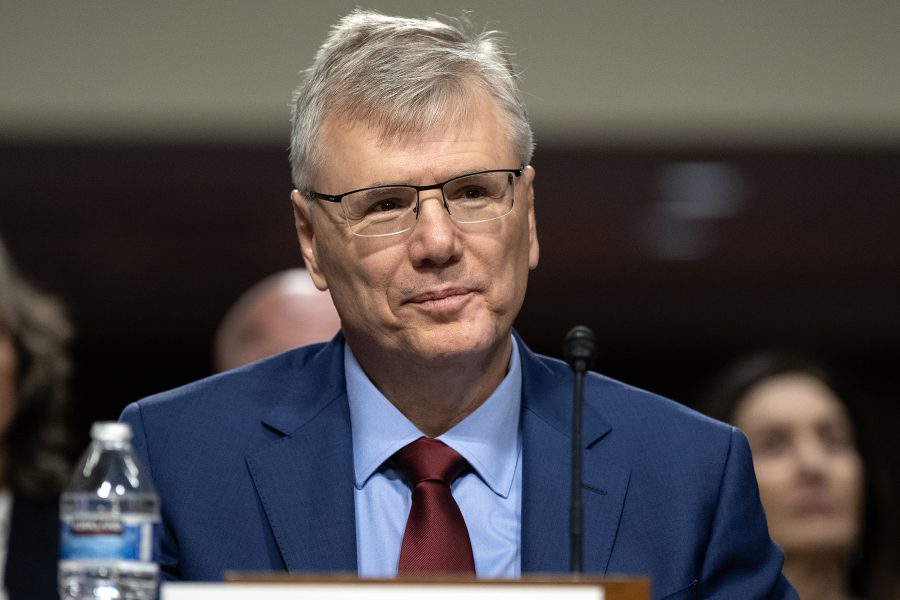The Senate confirmed Dr. Troy Meink to be the 27th Secretary of the Air Force May 13, nearly five months after President Donald Trump picked him to be the top civilian overseeing the Air Force and Space Force. The vote was 74 to 25.
A career civil servant with extensive high-level experience as a senior executive in various space intelligence roles, Meink was the No. 2 civilian at the National Reconnaissance Office during the last administration. NRO, a Department of Defense intelligence agency, works closely with the Space Force.
Meink is expected to begin his first full day on the job May 14.
Meink first rose to become principal deputy director at the NRO during the first Trump administration. He oversaw billions of dollars in satellite system acquisitions in that role. Prior to that, he was deputy undersecretary of the Air Force for space during the Obama administration. Meink is an Air Force veteran, having served as a KC-135 tanker navigator from 1988-1993 before changing his focus to space.
While initially an uncontroversial, under-the-radar pick, Meink’s nomination drew concern after reports circulated that SpaceX’s Elon Musk campaigned for him to get the job. Musk sat in on his job interview with Trump.
“I have no relationship with SpaceX or Mr. Musk outside of a professional relationship in the execution of my current duties,” Meink said in a written response to questions about the relationship between the two raised by Sen. Elizabeth Warren (D-Mass.), a member of the Senate Armed Services Committee.
Meink needed a simple majority to become SECAF, which he easily cleared.
One of the biggest decisions that Meink might have confronted—whether to pursue the costly sixth-generation Next-Generation Air Dominance crewed fighter—was made in March when Trump signed off on what is now called the F-47.
Modernizing the Air Force will be a central focus for the new secretary, but securing the space domain could be his greatest challenge. The Department of the Air Force is reorienting its budget towards the Trump administration’s priorities, especially his Golden Dome missile defense initiative, which calls for more advanced space tracking, interceptors, and lightning-fast data transfer. That will likely draw more resources to the Space Force, and possibly the Air Force. It will also draw scrutiny.
Space Force leaders have said they need more resources and manpower to keep up with their growing mission portfolio. Trump is seen as friendly to the Space Force, having championed its establishment in his first term, and Meink is the most space-experienced senior leader in the Pentagon.
“The department is building and operating some of the most complex systems ever fielded in both air and space,” Meink said during his confirmation hearing.
Other major programs ahead for the new secretary include the Sentinel intercontinental ballistic missile system, a program Acting Air Force Secretary Gary Ashworth said would likely be restructured as officials wrestle with the cost of modernization. Meink and Air Force Chief of Staff Gen. David W. Allvin will have to address delays in delivering new “Air Force One” aircraft from Boeing, as well as competition for funding that could threaten other programs.
AFA President & CEO Lt. Gen. Burt Field, USAF (Ret.) congratulated the new secretary. “The Air & Space Forces Association wishes you massive success as you take on the thorny issues facing our Space Force and Air Force,” he said. “We look forward to helping you wherever or whenever we can to ensure our Guardians and Airmen are able to dominate every future fight.”
During his confirmation hearing in March, Meink said the Air Force is “probably too small, both on the fighter and the bomber side of the house.”
The nominee to be Meink’s deputy as undersecretary of the Air Force is Matthew Lohmeier, a controversial pick who was fired as a Space Force squadron commander in 2021 after saying the service was taken over by Marxist ideology and was too focused on diversity, equity, and inclusion. Lohmeier testified before the Senate Armed Services Committee earlier this month, but the panel has yet to hold a vote on whether to send his nomination to the full Senate.
“First, near-peer competitors such as China are evolving faster than we are in some cases, which will eventually result in the U.S. losing our technological advantage,” Meink said during his confirmation hearing. “Secondly, some competitors, such as Russia, are fielding highly escalatory asymmetric capabilities. And third, our homeland is increasingly put on the defensive from threats such as cyberattack, unmanned aerial systems, and illegal activities at the border, including illicit drug trafficking.”




